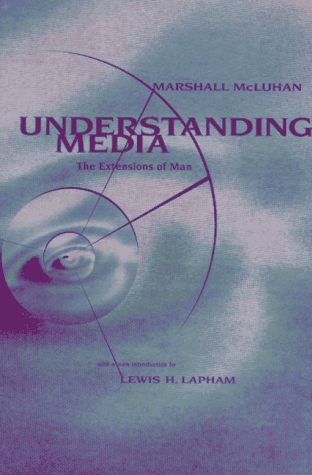
by Marshall McLuhan
Reprint Edition
Paperback, 365 pages
Published by MIT Press
Publication date: October 1994
Originally published in: 1964
Dimensions (in inches): 0.91 x 8.80 x 5.94
ISBN: 0262631598
 |
Understanding Media: The Extensions of Man by Marshall McLuhan |
|
Reprint Edition | |
| This is Marshall McLuhan's classic expose on the state of the then emerging phenomenon of mass media. Terms and phrases such as "the global village" and "the medium is the message" are now part of the lexicon, and McLuhan's theories continue to challenge our sensibilities and our assumptions about how and what we communicate. |
Synopsis:
This reissue marks the 30th anniversary (1964-1994) of McLuhan's
classic expose on the state of the emerging phenomenon of mass media.
In a new introduction, Harper's editor Lewis Lapham reevaluates
McLuhan's work in the light of the technological as well as the
political and social changes that have occurred in the last part of
the century.
Booknews, Inc., 1995-05-01:
A reissue marking the 30th anniversary of McLuhan's classic on the
then-emerging phenomena of mass media. McLuhan's prescient view of a
media-sculpted society of the future is supplemented by an
introductory essay by Lewis Lapham, editor of Harper's.
poston@prodigy.net, 1998-03-28, rating=10:
McLuhan is still "far-out man"
Since the advent of civilization, humans have been evolving themselves
through technology: foot into wheel, skin into clothing, teeth into
weapons, and finally, our nervous system into electric information. It
is this electric nervous system that now makes us so nervous about
modern life. Like Dylan's Mr. Jones, we know something's going on, we
just don't know what it is. McLuhan gives us clue-in, hear.
In his third book, McLuhan reviews the evolutionary extension of humans, and notes the impact that they have had, and the toll they take on consciousness. He asserts that this evolutionary progression, now manifested in the extensions of electricity, has placed our nervous system around the world. (The instantaneous, electric information carried inside by the nerves, is now externalized.) This is "media," and it impacts our perception of reality (what a concept,) and that to be forewarned of its impact is to be forearmed.
McLuhan is still "far-out man." Written in 1964, this book is more insightful and current than any present media pundit's prognostication. Hear in our lessons on how to surf the electronic wave into the shore light of the next millenium. But be advised, once you read McLuhan, you will never be able to ignore the media's massage again.
peebles1@aol.com, 1996-12-17, rating=10:
Big Brother is Dead.
McLuhan kills Big Brother on the last page of this book.
Unfortunately, McLuhan is not really a very good writer. He rambles
and makes so many obscure references that it's difficult to figure out
what he is trying to say. Part of the reason McLuhan is so hard to
understand is that the best examples of his ideas hadn't been invented
when he wrote this book. But the first and last chapters of
"Understanding Media" lay the groundwork for understanding
the effects of the PC revolution and the rise of the Internet. For
example, he explains that electric media is tactile in nature -- a
concept that is much easier to grasp now that we take a GUI for
granted. And though WIRED magazine claims him as patron saint, it's
clear that the editors do not grasp McLuhan's realization that the
consequence of what he calls "automation" (or
"cybernation") is "retribalization", and that our
mechanical notion of privacy is obsolete.